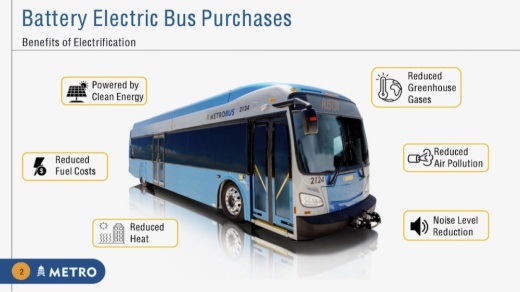According to a Capital Metro press release, the purchase represents the largest procurement of electric vehicles in U.S. history. The transit agency has a total of 424 buses currently, with 12 of those being electric.
The buses will roll out over the course of the next five years, according to Capital Metro documents. They will have vinyl seats with USB ports, a perimeter seating format and validators to check tickets at all doors.
Capital Metro Chief Operating Officer Dottie Watkins said the electric vehicles present numerous advantages including the reduction of greenhouse gases and air pollution.
“Recently, I was helping staff one of our Q2 Stadium events and walking down the line of buses, and immediately noticed when I was walking past the electric buses it was both cooler and quieter,” Watkins added. “It's a much better environment, not just for our riding public, but for our community as a whole.”
Of the 197 buses, 178 will be 40-feet long and will be able to travel an average of 114 miles per charge; and 19 will be 60-feet long and will be able to travel an average of 95 miles per charge. Watkins said charging the vehicles will likely include a mix of on-route charging and charging at the bus depot, but Capital Metro is continuing to evaluate its long-term strategy.
“We have plug-in chargers for our current 12 buses,” Watkins said. “We know that as we grow the fleet we want to transition to overhead charging, so the charging infrastructure [where] you can park under it, and it charges is the best, as opposed to having to plug in and unplug every single bus. As we get to a fleet of 400 buses we want to not have 400 plugs to manage.”
Capital Metro announced its plan to shift to zero-emission vehicles on Earth Day in 2019. The following year it constructed a charging facility and began to use 12 electric buses, which rotate throughout various routes.
“With climate change as it is we really need to accelerate these types of purchases and investments,” said Pio Renteria, a board member and Austin City Council member.





